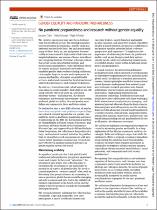No pandemic preparedness and research without gender equality
| dc.contributor.author | Clark, Jocalyn | |
| dc.contributor.author | George, Asha | |
| dc.contributor.author | Khosla, Rajat | |
| dc.date.accessioned | 2023-06-20T07:20:44Z | |
| dc.date.available | 2023-06-20T07:20:44Z | |
| dc.date.issued | 2023 | |
| dc.identifier.citation | Clark, J. et al. (2023). No pandemic preparedness and research without gender equality. BMJ (Clinical research ed.), 381, 1213. 10.1136/bmj.p1213 | en_US |
| dc.identifier.issn | 1756-1833 | |
| dc.identifier.uri | 10.1136/bmj.p1213 | |
| dc.identifier.uri | http://hdl.handle.net/10566/9119 | |
| dc.description.abstract | The covid-19 emergency may have been declared over, but its effects are not. Pre-existing inequities worsened during the pandemic, and the crisis has hardened societal fault lines. Sex and gender mark many of these. Early on, sex and gender featured visibly as men seemed at higher risk of infection and hospital admission, and women of longer term illness and caregiving burdens. Over time, it became evident that covid-19 was exacerbating multiple and intersecting vulnerabilities, with substantial effects on women and girls: increased care burdens, amplified gender based violence during lockdowns, catastrophic drops in income and employment for women and families, disrupted essential health services, and school closures that heightened risk of unintended pregnancies and permanent dropouts. | en_US |
| dc.language.iso | en | en_US |
| dc.publisher | NLM (Medline) | en_US |
| dc.subject | Public health | en_US |
| dc.subject | Gender studies | en_US |
| dc.subject | Equality | en_US |
| dc.subject | Covid-19 | en_US |
| dc.subject | Africa | en_US |
| dc.title | No pandemic preparedness and research without gender equality | en_US |
| dc.type | Article | en_US |

